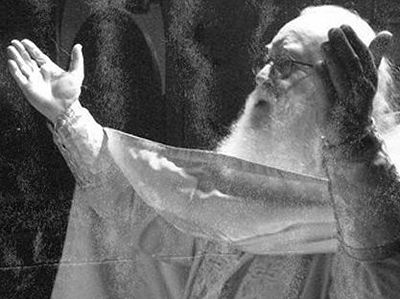I am crucified with Christ nevertheless I live, yet not I, but Christ liveth in me (Gal. 2:16-20)
These words, my beloved brethren, are extracted from Paul’s epistle to the Galatians, which was read during today's Liturgy. Paul emphasizes two important people—our Lord, Jesus Christ, and himself. If you read the last sermon, you will remember the account rendered of Paul's self-defense against the false teachers that attacked him and his gospel. In his defense, Paul stated emphatically that the Gospel that he preached and wrote was not of human invention. It is not a human teaching, but an apocolypse, a revelation “of Jesus Christ.” It is really a supernatural event, beyond the frontiers of human conception, as to how God speaks to His people, through those whom He chose as vessels of the Word. As such, the Gospel as revelation of Christ is eternal and irreplaceable. The validity of the Gospel was not established only for yesteryear, but also for today and tomorrow. And actually, beyond that—being for all ages and epochs; for all men, regardless of race, creed, or color.
St. Paul, in speaking about himself, relates how he persecuted the Church because of his zealous adherence to his fatherly traditions. Paul talks about his conversion to Christ and about that hour in which he was writing the epistle to the Galatians, when he crucified himself and died. Paul does not live, the old Paul has died. Rather, instead of him living, Christ lives in him: I am crucified with Christ, nevertheless I live, yet not I, but Christ liveth in me.
St. Chrysostom explains what Paul means by these words. St. John says that Paul was able to make this claim because in fact his will disappeared, permitting the will of Christ to govern his life. All his actions and activities, continues Chrysostom, all his behavior towards God and man were geared by the will of God.
The truth of the matter is, my brethren, that there are many things that we can neither teach, nor prove. Rather, we feel these things inside of us; an experience, as it were, that is unable to be outwardly expressed in terms of proof. In order for those around us to comprehend these things, they must experience them from within their own beings. Paul says, Christ lives in me, He lives in the very essence of my inner being. It is an internal savor that can be tasted of only by living the experience of having Christ living within us.
People come to Church. They open their mouths to receive Holy Communion. They offer their mite to the Church. They listen to the sermon, and they read the humble words of their pastor. But they fail to proceed any further. They have yet to experience that same feeling for Christ as did Paul. They have failed to harmonize their lives with the life and will of Christ. They simply do not understand that supposedly man becomes a Christ-bearer, and as the first Christians referred to St. Ignatius, he is expected to carry “Christ in his chest.”
Paul also speaks about the same subject in another of his epistles, And if Christ be in you, the body is dead because of sin but the spirit is alive because of righteousness (Rom. 8:10). In other words, if we permit Christ to govern our lives, to make our bodies His temple, then our bodies will be dead to sin, and unable to commit sin. While on the other hand, the spirit (the spiritual man) will live, move, and direct us towards the achievement of virtue. Rather than permitting sin to direct us, we will subject ourselves to the will of Christ.
The will of Christ—the life of Christ living in us—is not in contradiction to, nor incompatible with, our natural life. In fact, it is only when we successfully harmonize our own life with the life of Christ that we will be able to progress both in body and spirit. Last week in my Patrology class at the Seminary, I reviewed the ascetics and authors of the fourth and fifth centuries A.D.—St. Antony, Pachomius, the two Macarii, Neil, Arsenius, and others. All of these Fathers lived to be eighty years old and over. Perhaps someone will argue with that old, over-used phrase, “But what do the monks do? They sit all day.” This statement can be made only by those who are ignorant of the history of monasticism. However, it is not my task here to refute this argument and offer a defense on behalf of monasticism and its contribution to the world. But for a moment let us ask, Why do the monks live such a long life, and one that is filled with spiritual productivity? Simply because they permitted the life of Christ to govern their lives. They re-enacted in their own lives the words of Paul, Not I, but Christ liveth in me.
My beloved listeners, maybe you live a rich life, not wanting for anything that is good. Perhaps you possess all the good things in life like those mentioned in the parable, and are satisfied daily. And finally, you might even dress in the finest of clothing—in purple and gold. But if Christ does not live in your bodies—no matter how satisfied with wealth of food, money, and clothing you may be—then the words of St. John in his Revelation, addressed to the angel of the Church of Sardis, apply to you, I know thy works, that thou hast the name, that thou livest and are dead (Rev. 3:1-2).
Be watchful and strengthen your lives. This exhortation, be watchful, asks that you open your eyes and try to understand life. Simply because a body moves, or runs, or makes sounds does not indicate that it is genuinely alive. Rather, such a body lives, in the words of Aristotle, the life of a grazing animal (Voskimatodes Zoi). Real life is the life in Christ, the life that was lived by Paul, the saints of the Church, and all good Christians of today. Find this life, my beloved, come to know its joy and peace, so that at your end you, too, may say with Paul: I am crucified with Christ nevertheless, I live, yet not I, but Christ liveth in me. Amen.
From the book, Orthodox Sermons.





